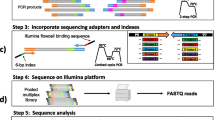Abstract
The development of an Arabidopsis population via single-seed descent is described which includes 3,000 lines that carry approximately 15,000 independent insertions of the autonomous maize element En-1. A PCR strategy is outlined which allows the recovery of En-1-insertion mutants among this population in any random gene sequence of Arabidopsis thaliana. The method employs PCR reactions on pooled DNA. Positive amplification using a target-specific primer and an En-1-specific primer on row, column and single-tray pools identifies the putative insertion mutant. In a control experiment two insertion mutants of the PIN gene were successfully identified. In addition, a new independent insertion in the PIN gene was detected which was transmitted to the next generation and showed co-segregation with the pin phenotype. These examples demonstrate that the inheritance of inserts of the autonomous element En-1 is stable enough to make a proper genetic analysis feasible in a genomic background with multiple En-1 inserts.
Similar content being viewed by others
Author information
Authors and Affiliations
Additional information
Received: 20 March 1998 / Accepted: 31 March 1998
Rights and permissions
About this article
Cite this article
Baumann, E., Lewald, J., Saedler, H. et al. Successful PCR-based reverse genetic screens using an En-1-mutagenised Arabidopsis thaliana population generated via single-seed descent. Theor Appl Genet 97, 729–734 (1998). https://doi.org/10.1007/s001220050949
Issue Date:
DOI: https://doi.org/10.1007/s001220050949




